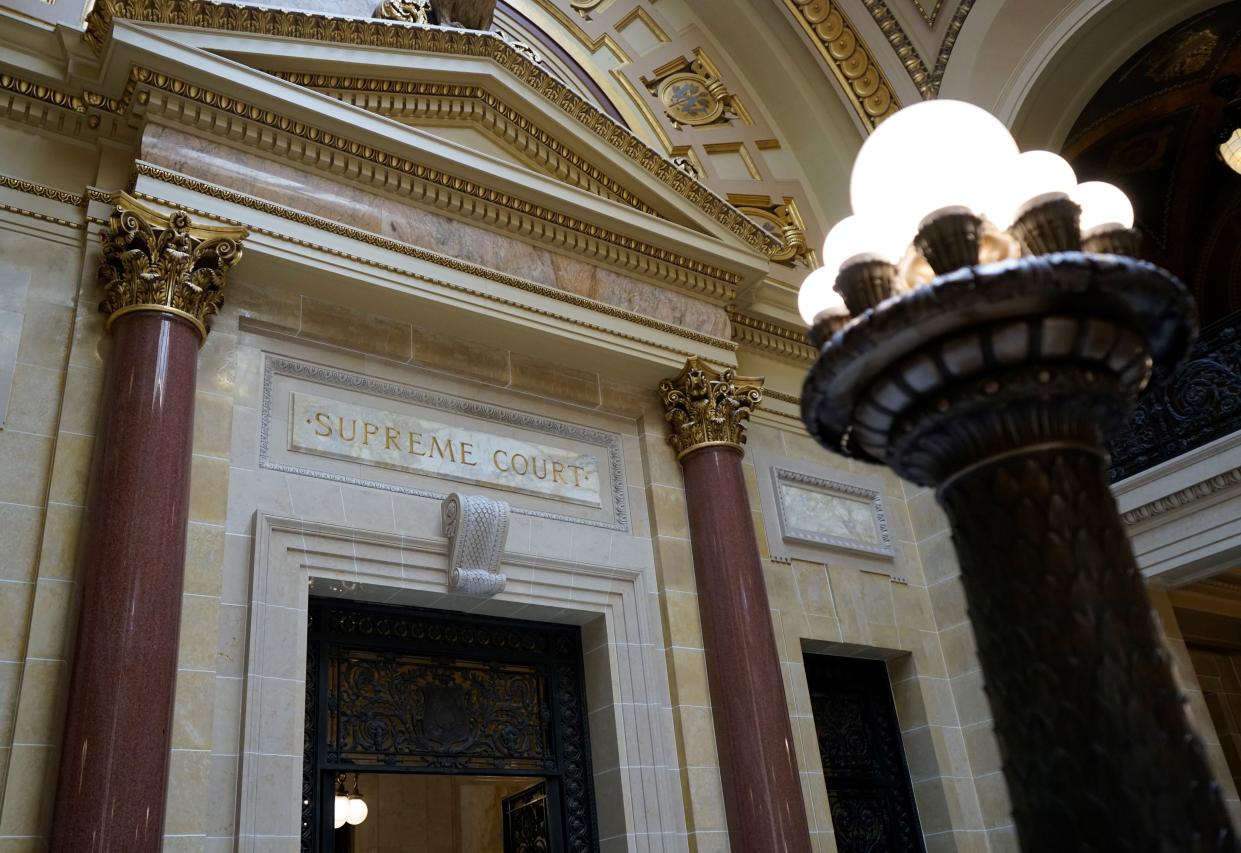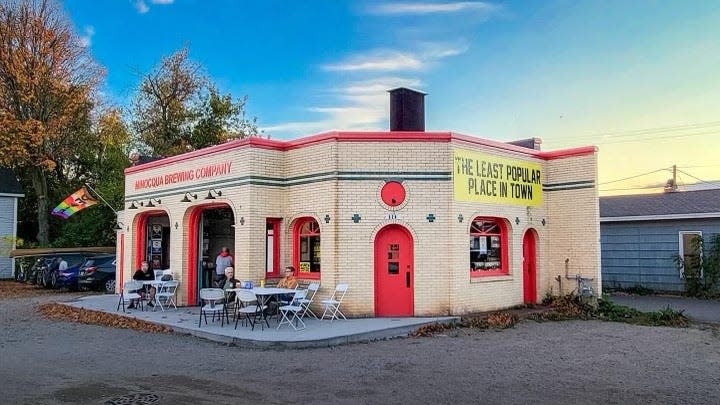What to know about a Minocqua brewery PAC’s lawsuit against Wisconsin's school vouchers

- Oops!Something went wrong.Please try again later.
A Wisconsin Democrat is asking the state Supreme Court's new liberal majority to eliminate funding for the state's four taxpayer-funded school voucher programs and independent charter schools while also lifting state-imposed limits on the amount of funding public schools can receive without a referendum.
If successful, the lawsuit would upend the state's K-12 education landscape by effectively eliminating the school voucher programs, one of which is more than 30 years old and used by nearly 30,000 children in Milwaukee.
Private school voucher programs provide participating schools with a taxpayer-funded voucher to pay for the tuition for each student who is eligible to enroll in the program. The students are typically from lower- and middle-income families.
The state's first voucher program began in Milwaukee in 1990, but the number of vouchers exploded over the last 10 years after Republicans made it a priority to expand the program to the rest of the state.
Last school year, about 29,000 students participated in the Milwaukee voucher program, 17,000 in the statewide program, 4,000 in the Racine program, and 2,000 in the state's voucher program for students with disabilities — costing a total of about $444 million.
The lawsuit was brought by former Democratic candidate for the U.S. House and state Assembly Kirk Bangstad, who owns the Minocqua Brewing Co. and has created a political action committee using his brewery's namesake to raise money for Democratic causes. The brewery produces beer with politically themed names.
More: Here's what charter schools are and how they work in Wisconsin
The lawsuit, filed on behalf of seven Wisconsin parents and grandparents, asks the court to stop three state officials from continuing the choice programs: Assembly Speaker Robin Vos, Superintendent of Public Instruction Jill Underly and Secretary of the Department of Administration Kathy Blumenfeld.
The suit directly petitions the state Supreme Court to find that the public funding of the state's choice programs and independent charter schools is unconstitutional. While the court usually hears appeals in cases that have already been tried in lower courts, it does have authority to take cases brought directly to it.
Public schools advocates applauded the suit, arguing that vouchers to private schools have drained resources from public schools, while private school advocates slammed the suit and vowed to fight it.
Advocates for private school voucher schools said the effort would hurt thousands of low-income families throughout the state who use the programs to attend private schools.
Here's what to know about the case.
Why is a Minocqua brewery involved in a lawsuit about Wisconsin school vouchers?

Bangstad ran as a Democrat for Congress in 2015 and state Assembly in 2020. He has drawn attention for his outspoken political stances, hanging a giant "Biden/Harris" sign outside the brewery and battling with local government bodies.
He started selling "Progressive Beer" with names like "Bernie Brew" and "Fair Maps" in 2020, and he launched the Minocqua Brewing Co. SuperPAC in 2021.
The PAC has funded other suits in recent years, including one against the Waukesha School District for removing COVID precautions, and another alleging three Wisconsin Republicans conspired to keep Biden from becoming president.
In May, Bangstad said he considered three major issues for the PAC to tackle: abortion, electoral maps and public education. With legal efforts already underway on the first two topics, he turned to public education. He saw the voucher system as siphoning funds from public schools.
"If we can prove that school vouchers are unconstitutional, our Supreme Court will strike them down and stop your tax dollars from flowing out of public education, benefitting the vast majority of students across Wisconsin attending public schools," he said in a note to supporters.
What are the grounds for the Minocqua PAC's lawsuit against vouchers?
The lawsuit is filed on behalf of: Julie Underwood, former dean of the University of Wisconsin School of Education; Charles Uphoff, former member of the Oregon School Board; Randy Wendt, former police officer and school counselor in the Arbor Vitae Woodruff School District; Tom Mueller, a priest from Campbellsport; Angela Rappl, a special education liaison for Milwaukee Public Schools; Dustin Imray, a parent from Madison; and Scott Walker, a parent from Prairie du Chien (not the former governor).
The case argues that the voucher programs violate the state Constitution's declaration that public funds be spent for public purposes, alleging that vouchers defund public schools, do not allow for adequate public oversight, and do not hold private schools to the same standards as public schools.
The attorneys are Brian Potts from Perkins Coie in Madison and Frederick Melms, who has a private practice in Woodruff, Wisconsin.
Does the lawsuit stand a chance with the Wisconsin Supreme Court?
The plaintiffs are asking the court to take up the case directly, bypassing the lower courts. Historically, the court has done this only rarely — but in the last few years, it has granted a significantly higher percentage of original action requests than in previous decades.
The court’s liberal justices often opposed doing this while they were in the minority. After Justice Janet Protasiewicz joined the court in August, the new liberal majority has agreed to take up at least one case directly.
In a 2020 case challenging Democratic Gov. Tony Evers’ COVID-19 stay-at-home order, Justice Rebecca Dallet was joined by her fellow liberal justices in declaring the majority’s decision to grant an original action as “the latest step in the majority's efforts to transform this court from one of last resort to the first stop for any discontented Wisconsinite.”
Conservative Justice Brian Hagedorn, who has been a swing vote in several high-profile cases, has also raised concerns with the court’s tendency to expedite cases.
“It is no wonder our supreme court races are seen as high stakes affairs when this court is seen as willing — even eager — to dispense with standard procedures and forcefully insert itself into the latest hot-button political issues,” Hagedorn wrote, concurring with a decision declining to allow a case challenging a school district's gender identity policy to bypass an appeals court.
Hagedorn noted that the state Supreme Court is not designed to resolve factual disputes.
In his concurrence, Hagedorn counted 11 of 39 original action petitions granted since he joined the court in August 2019, compared to three of 56 granted in the 12 previous years.
“Nothing in our constitution or tradition suggests this court alone should decide significant constitutional questions, and do so first,” he wrote.
So it’s possible the court will decline the original action, leaving plaintiffs to file a challenge at the circuit court level.
It’s early in the court’s term, though, so there aren't many examples of the court’s decision-making process under its new liberal majority.
Although campaign contributions don’t guarantee how a justice will vote, they can provide insight into a justice’s views and the interests of their supporters. All told, teachers unions have spent at least $200,000 to support the liberal justices' campaigns.
What are the reactions to the suit?
Underly, who campaigned against expanding vouchers when she ran for the state superintendent position, hasn't said whether she supports the aims of the lawsuit but released a statement in reaction to the suit, noting her support for public education as a constitutional right.
"And as a right guaranteed to our children, and as an opportunity for our state to put our money where our priorities should be, Wisconsin needs to fulfill its responsibility to effectively, equitably, and robustly fund our public education system," the statement said. "I welcome any opportunity to move Wisconsin in that direction.”
Spokespeople for the other named defendants, Vos and Blumenfeld, did not respond to requests for comment.
The Wisconsin Public Education Network applauded the suit as a "long-overdue challenge" to the state's "failed experiment" with vouchers and independent charter schools.
Opposition came from several organizations that support vouchers, including Nic Kelly, president of School Choice Wisconsin, who said in a statement that "efforts to kill school choice will hurt thousands of low-income families throughout the state."
"If successful, their efforts would destroy a popular program that serves thousands of Wisconsin families. The arguments that it makes would call into question Wisconsin’s entire education system, throwing us all into chaos," said Wisconsin Institute for Law & Liberty president and general counsel Rick Esenberg.
Americans for Prosperity-Wisconsin called on the Wisconsin Supreme Court to dismiss the case, calling it an "asinine political stunt."
Molly Beck contributed to this story.
Contact Rory Linnane at rory.linnane@jrn.com. Follow her on Twitter at @RoryLinnane.
Jessie Opoien can be reached at jessie.opoien@jrn.com.
This article originally appeared on Milwaukee Journal Sentinel: Minocqua Brewing Co. PAC sues Wisconsin school choice vouchers

